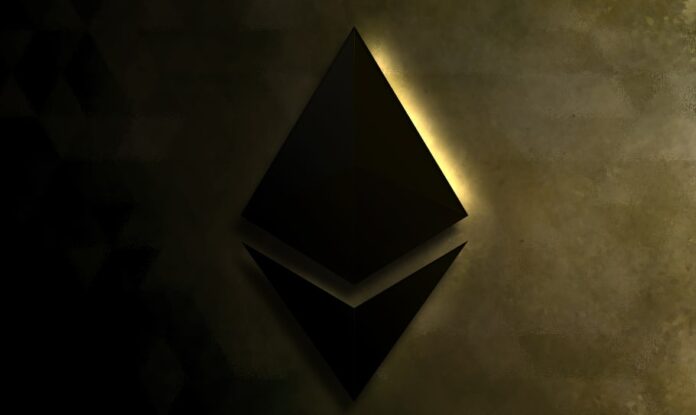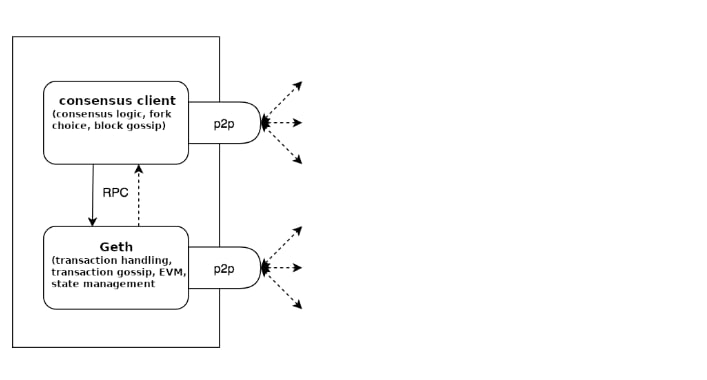
Although The Merge will bring profound changes to Ethereum's architecture, the developers of the Go Ethereum (GETH) client assure that there will be minimal changes to the way their users interact with the network using their software.
Go Ethereum (GETH), the main client of the Ethereum network, has announced the launch of a new update with which it prepares to receive the long-awaited merger, The Merge, on the Ethereum mainnet.
On Twitter, the developers of this execution client reported that The new version Geth v1.10.22, also called Promavess, is the first release for The Merge on the Ethereum mainnet, which includes two Improvement Proposals or EIPs to move the network consensus to the so-called proof of stake or PoS. You can learn more about Ethereum and the ERC-20 token in the following Bit2Me Academy article.
Currently, Ethereum developer Péter Szilágyi warned on Twitter that the updated version of GETH for The Merge is experiencing problems and that the team is working on a solution. Also, a warning on GitHub points out that Promavess “seems to contain a regression that may affect the local state”, so developers recommend that nodes running the Ethereum client wait until the problem is fixed.
It may interest you: What will happen if the Ethereum “difficulty bomb” is deactivated?
How will Go Ethereum be used after The Merge?
Ethereum's transition from PoW to PoS will change the way the client software for Ethereum nodes is organized, so users running full nodes on the mainnet will need to adapt to certain changes first.
The Go Ethereum client explained that first of all, full nodes will need to run an execution client and a consensus client after The Merge is activated on the mainnet. This is in order to continue its work of verifying transactions, managing states, and more, within the network. As explained by Go Ethereum, once The Merge is implemented on the mainnet, the Geth client will not be able to track the Ethereum main chain on its own, but will need to be coupled with a consensus client.
After The Merge, the consensus client will be responsible for handling transactions, verifying states, connecting to the Ethereum Virtual Machine (EVM), among other things.

Go Ethereum client recommends users running full nodes on the mainnet start running a consensus client before the arrival of The Merge, to ensure that client setup takes place smoothly on the new blockchain.
Go Ethereum also assures that despite the changes being introduced to the client software in preparation for The Merge, the experience for Geth users will not change significantly.
When will The Merge happen?
Unlike other upgrades Ethereum has implemented, The Merge is not set to occur at a certain block height. Instead, the developers have defined a total difficulty as the time to carry out the network transition.
Geth v1.10.22 has been set to enable The Merge on the Ethereum mainnet in a total terminal difficulty or TTD of 58750000000000000000000, which is the TTD defined by the Ethereum development team to execute the consensus protocol change on the mainnet.
Concerns about Ethereum centralization
Preparations for The Merge on Ethereum continue as Concerns about network centralization and security are growing.
This week, several experts and users in the crypto industry spoke out against the upcoming consensus change on the network, pointing out that the transition to PoS could expose Ethereum to new dangers related to centralization and stricter regulatory control by regulators, due to the doubts and concerns that arose with the Sanctions imposed by the Treasury Department on Tornado Cash and the arrest of one of the developers of this platform in the Netherlands.
Added to all this are the actions that several companies, such as Infura, which is one of the largest providers of blockchain infrastructure to connect to Ethereum, have taken against addresses associated with Tornado Cash and the recent comments by the president of the Securities and Exchange Commission (SEC), Gary Gensler, who is exerting greater regulatory pressure to control the global cryptocurrency market.
Continue reading: The Merge will not reduce gas fees, says Ethereum Foundation


